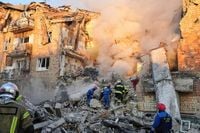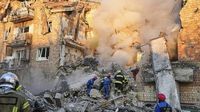In the early hours of August 28, 2025, Kyiv awoke to devastation. Russia unleashed an aerial assault of nearly unprecedented scale, launching almost 600 drones and more than 30 missiles across the Ukrainian capital. The barrage, described by officials as the second-biggest air attack since the war began three years ago, left at least 23 people dead—including four children, the youngest just two years old—while dozens more were injured and eight remain unaccounted for. The attack struck not only residential neighborhoods but also critical civilian infrastructure, including the offices of the European Union Delegation and the British Council, according to reports from multiple outlets including National Security Journal and The Independent.
The impact was immediate and profound. Kyiv’s mayor, Vitali Klitschko, declared August 29 a day of mourning. Flags were lowered across the city, and all entertainment events were canceled. In a somber message posted to Telegram, Klitschko explained, “Tomorrow, August 29, has been declared a Day of Mourning in Kyiv. In memory of the victims of the enemy’s massive attack on the capital. On this day, flags will be lowered on all municipal buildings in the city.” He encouraged private and state buildings to do the same, underscoring the city’s collective grief.
The attack’s scope was staggering. Strikes rained down on several districts: Obolonskyi, Desnianskyi, Shevchenkivskyi, Solomyanskyi, Dniprovskyi, Darnytskyi, and Holosiivskyi. According to AP News, the city center—rarely targeted in previous attacks—was not spared. Rescue operations began immediately, with Interior Minister Ihor Klymenko describing a massive mobilization: “Thousands of personnel from the Interior Ministry’s agencies and units worked at the strike sites in Kyiv, rotating every few hours,” he said, noting that the rescue operation stretched over 30 hours. Seventeen people—including four children—were pulled from the rubble alive, but the search for survivors continued as authorities acknowledged that some bodies had yet to be identified.
The human toll was matched by significant damage to infrastructure. The British Council’s Kyiv office suffered damage from missile shrapnel, shattering windows and injuring a security guard. The European Union mission building was hit by shockwaves and missile strikes in close proximity—two rockets reportedly landed within seconds of each other near the mission. The symbolism was not lost on European leaders, who expressed outrage at the attack. As National Security Journal highlighted, these strikes came even as discussions about a possible peace deal—including the contentious issue of ceding territory in Ukraine’s east—remained deadlocked.
On the diplomatic front, the assault deepened the sense of stalemate. U.S. President Donald Trump, who has been pushing for direct talks between Russian President Vladimir Putin and Ukrainian President Volodymyr Zelenskyy, voiced frustration over Moscow’s hesitancy. “Russia refused to stop the killing—they even said ‘no’ to President Trump. We’re seeing negative signals from Russia regarding a possible leaders’ summit,” Zelenskyy wrote in a social media post, as cited by The Independent. Trump, for his part, complained that Putin “talks nice and then he bombs everybody,” but notably, the Trump administration offered no public condemnation of the latest attack, instead pointing to Ukrainian strikes on Russian oil refineries.
European Union defense ministers were unequivocal in their response, vowing to increase pressure on Moscow. Outrage was palpable, with officials pledging to ramp up sanctions and tariffs in hopes of curbing Russia’s aggression. Ukrainian Foreign Minister Andriy Sybiha announced that, at Kyiv’s request, the United Nations Security Council would convene an emergency meeting on August 29 to address the attack and the broader crisis. The upcoming U.N. General Assembly, scheduled to begin September 9, is also expected to focus heavily on the ongoing conflict.
Meanwhile, diplomatic maneuvering continued behind the scenes. Ukrainian Prime Minister Yuliia Svyrydenko and presidential chief of staff Andriy Yermak traveled to New York for discussions with Western officials about potential security guarantees—measures intended to deter future Russian invasions if a peace deal is reached. Yet, as AP News reported, Russia has remained inflexible. Zelenskyy’s administration accepted a U.S. proposal for a ceasefire and a direct meeting with Putin, but Moscow has repeatedly raised objections. Russian Foreign Ministry spokesperson Maria Zakharova argued, “The provision of security guarantees is not a condition, but rather the result of a peaceful settlement that eliminates the root causes of the crisis in Ukraine. That in turn will guarantee the security of our country.”
The situation’s complexity is compounded by shifting international alliances. Putin is scheduled to attend a summit in China beginning August 31, alongside leaders from Iran and North Korea—both countries that have supported Russia’s military efforts, according to U.S. officials. The summit’s timing, just days after the Kyiv attack, has fueled speculation about Moscow’s future intentions and the possibility of broader geopolitical realignment.
As the humanitarian toll mounts, pressure is building for a breakthrough. Zelenskyy has urged the international community to intensify economic sanctions, warning that “Russia refused to stop the killing” and remains uninterested in genuine peace. Analysts at the Atlantic Council noted that Western powers, particularly the United States, possess the capacity to counter Russia’s advances but may lack the political will to do so. Their assessment, as cited by The Independent, observed, “Putin knows that Washington and its allies have more than enough capacity to reverse his gains in Ukraine, but it is nearly certain that he doubts the United States has the will to do so.”
For now, Kyiv mourns. The city’s day of remembrance stands as a stark reminder of the war’s cost—and the urgent need for a durable peace. As rescue workers continue their grim task and diplomats search for common ground, the people of Ukraine face an uncertain future, united in grief and resolve.



